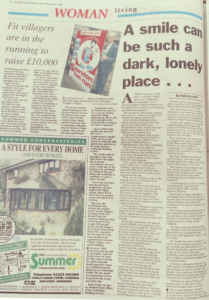A smile can be such a dark, lonely place
Written by sue Elliott, this article appear in the Cambridge Evening News on 24 February 1995, as part of a full page spread on the Sawston Fun Run, its chosen charity, EAST, and autism.
 A smile can be a dark place, a kindly touch can seem ominously threatening. For a person trapped inside themselves by autism the work is a confusing and distressing place.
A smile can be a dark place, a kindly touch can seem ominously threatening. For a person trapped inside themselves by autism the work is a confusing and distressing place.
No-one knows what causes autism, and – as yet – there is no cure. It is a condition which lasts for life.
It is a mental disability which almost always develops before the age of three, but often is not diagnosed for years, mainly because people with autism rarely look different from anyone else.
Four times as many boys as girls are affected, but it is not bound by class, creed or race. There are an estimated 1,000 sufferers in Cambridgeshire, Norfolk and Suffolk.
People with autism suffer in various ways to various degrees, but a common thread is the problem they have with communication. Many never learn to speak, or have great difficulty with language.
They cannot fully understand what other people say to each other. Ordinary signals and words are misread by the brain and the most innocent behaviour or words can be seen as threatening.
They are often unable to share the warmth and love of family life or make friends easily.
Autism also affects the sufferer’s ability to respond or relate to theirs, often thwarting their best efforts. This leads to lonely isolation. The only way the person with autism seems to be able to cope with their anxieties and frustrations is to retreat within themselves.
Owen Spencer-Thomas is chairman of EAST, the East Anglian Autistic Support Trust, which launched a £1 million appeal two years ago to provide a home for young adults with autism.
In the first 18 months, the appeal raised £100,000 and organisers were optimistic that it would be eligible for up to two-thirds of the cost from housing association grants. But now the Government has cut these budgets in this area by 62 per cent and EAST fears its project could be hit.
Special accommodation is desperately needed in Cambridgeshire, said Mr Spencer-Thomas, because after the age of 19, people with autism stop being the responsiblity of education services, and what help was available to them and their parents comes to a halt.
“At school leaving age, the education authorities withdraw and suddenly they are treated as young adults. this is not right for them or their families, they are left high and dry,” he said.
“People warm to children with autism because they are often delightful looking children, but they become confused about the response they get. Then as they grow, a kindly world changes to a hostile one.”
Parents, as they age, may not be able to care for these young adults as they could when they were small.
“We all become aware that there will come a day when they cannot live at home as they once did. But scarcity of places and lack of funding mean there is nowhere else for them to go.”
People with autism need a safe and understanding environment with trained staff who know how to cope. Sometimes there are dramatic mood swings which can upset the sufferer as much as the onlooker.
Four years ago, the nearest home for people with autism was Middle Field Manor near Barton Mills in Suffolk, the first residential community for 14 adults in East Anglia, was opened by the National Autistic Society.
But local families are still faced with having to send their young people hundreds of miles away, which can be distressing to both sides.
Now EAST is negotiating for land at Ely, where it hopes to build a community, housing about a dozen adults with autism and possibly providing day care facilities for non-residents.
“Cambridgeshire is the only county in the Eastern region without something like this,” said Mr Spencer-Thomas.
Don Cupit is senior community education tutor at Sawston. He and his wife have two sons, the younger of whom, Richard, has autism. His isolation is even greater because he is also deaf.
Now in his twenties, Richard has to live away from his family, and the nearest places they could find were in Bristol or Manchester, though he comes home for all the school holidays.
“To have some provision locally is an absolute essential. If this as to go ahead there is a possibly that Richard could apply for a place,” said Mr Cupit.
The family has worked hard to carry on as normally as possible. “We get on with our jobs and carry on normal family life as best we can, but it can be very hard. The main problem is that people with autism give so little, sometimes nothing, back to a relationship.
“Getting a babysitter when he was little wasn’t too difficult, but after the age of eight we felt we couldn’t ask people to sit with him. His changes in mood could be so quick and dramatic and you have to know how to cope.
“Getting any type of help, even respite care, in this area is very difficult because there is so little.”
